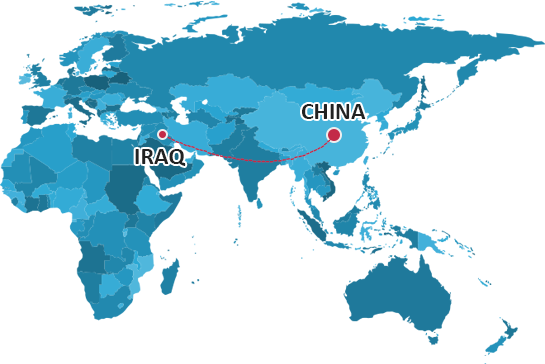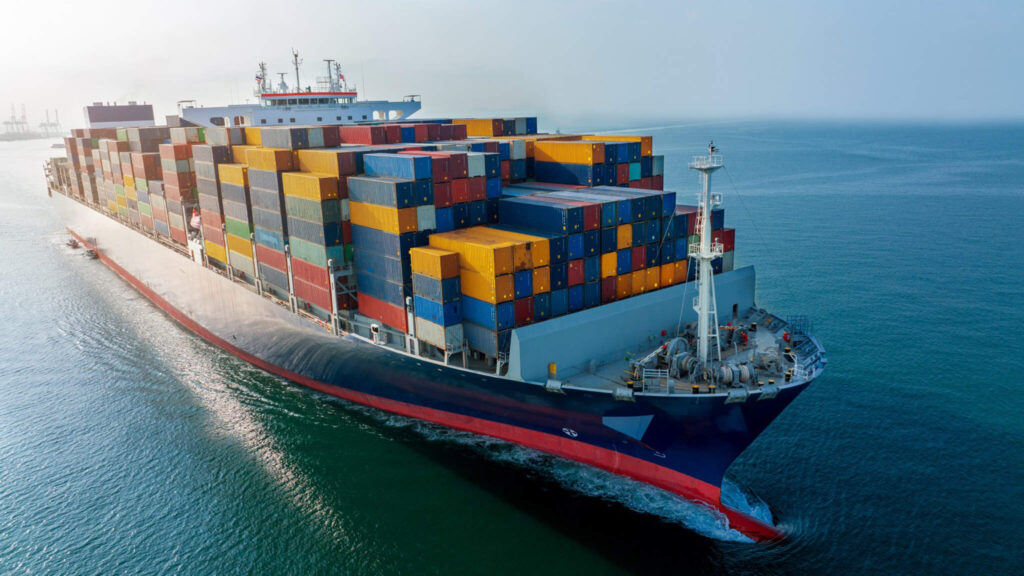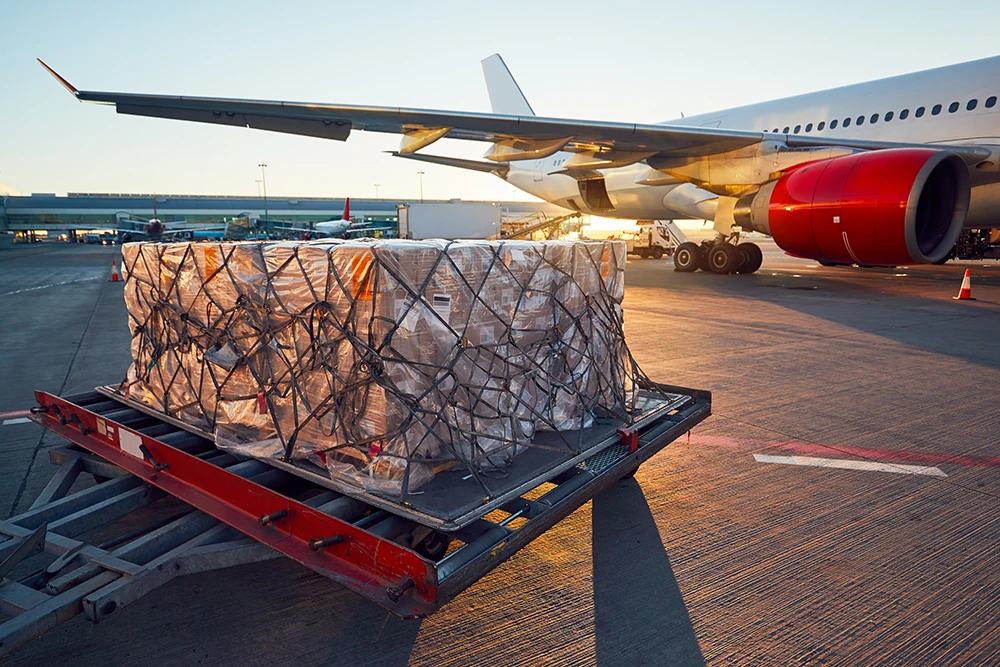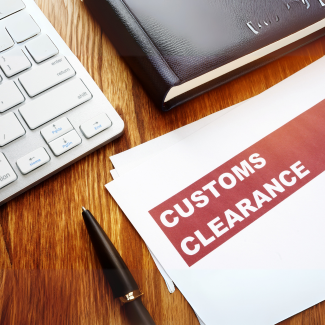- By TOP CHINA FREIGHT
- August 27, 2025
- Shipping
Shipping from China to Iraq is becoming increasingly important for businesses importing electronics, machinery, textiles, and construction materials. Importers often face challenges such as fluctuating freight costs, border delays, and complex customs requirements. This guide provides actionable insights, detailed transportation strategies, and practical advice to ensure your shipments arrive on time and within budget.

1.Transportation Options
Choosing the right mode of transport depends on urgency, cargo type, and budget.
| Method | Transit Time | Best For | Estimated Cost |
|---|---|---|---|
| Sea Freight | 20–35 days | Bulk shipments, non-perishable goods | $2,000–$5,000 per 20ft container |
| Air Freight | 3–7 days | Urgent, high-value items | $5–$9 per kg |
| Road Freight | 7–15 days | Medium-volume shipments, door-to-door | $1,500–$3,500 per truck |
| Express Courier | 2–5 days | Small parcels, samples | $6–$12 per kg |
Actionable Advice:
- Use sea freight for cost-efficiency in large shipments.
- Air freight is suitable for urgent or fragile cargo.
- Road freight offers flexibility for final delivery inside Iraq.
2.Sea Freight: Major Shipping Routes

Sea freight is ideal for large or heavy shipments from China to Iraq, especially to ports like Umm Qasr.
Popular Routes
- Shanghai → Umm Qasr
- Ningbo → Basra (via transshipment in Dubai)
- Shenzhen → Umm Qasr via Jebel Ali
Advantages
- Cost-effective for bulk cargo
- Can handle oversized or heavy machinery
- Suitable for FCL and LCL
Tips:
- Book in advance to avoid peak season congestion.
- Consider port transshipment options to reduce overall shipping time.
- Track shipments to coordinate inland transport in Iraq.
3.Air Freight: Fast and Reliable

Air freight is recommended for urgent, high-value, or perishable goods.
- Transit Time: 3–7 days
- Best For: Electronics, fashion, medical supplies
- Airports: Baghdad International Airport (BGW), Basra International Airport (BSR)
- Cost: $5–$9 per kg
Tips:
- Confirm weight and dimensions to avoid extra charges.
- Use economy air freight for non-urgent shipments to reduce costs.
- Pre-clear customs for faster delivery.
4.Road Freight: Flexible Overland Option

Road transport is essential for inland delivery in Iraq and can be combined with sea or air shipments.
- Transit Time: 7–15 days depending on origin and border crossings
- Best For: Medium-volume shipments, door-to-door delivery
- Advantages: Flexible routes, avoids congestion at major ports
- Challenges: Border inspections may delay shipments; security conditions may vary
Tips:
- Use reputable trucking companies familiar with Iraq’s regulations.
- Secure insurance for transit through high-risk regions.
5.Customs Clearance in Iraq

Proper documentation ensures smooth clearance:
| Document | Purpose |
|---|---|
| Commercial Invoice | Declares the value and type of goods |
| Packing List | Details weight, quantity, and dimensions |
| Bill of Lading / Air Waybill | Proof of shipment |
| Certificate of Origin | Eligible for preferential tariffs |
| Import Licenses | Required for controlled items like electronics, chemicals, or food |
| Insurance Certificate | Protects high-value shipments |
Pro Tips:
- Submit digital copies in advance to customs brokers.
- Ensure HS codes are accurate to prevent fines.
- Pre-calculate duties and taxes to avoid delays.
6.Specialized Cargo Handling
Some goods require extra attention:
- Perishables: Refrigerated containers or cold-chain logistics for food and pharmaceuticals.
- Hazardous Materials: Correct labeling, permits, and compliance with international standards.
- Oversized Machinery: Flat racks or open-top containers for sea freight.
Tips:
- Confirm your forwarder’s experience with specialized cargo.
- Check Iraq’s import regulations for restricted items.
7.Warehousing and Consolidation
Freight forwarders often provide:
- Warehousing in China for consolidation
- Temporary storage in Iraq for scheduled delivery
- Repackaging or labeling according to Iraqi standards
Benefits:
- Reduce shipping costs through LCL consolidation
- Ensure compliance with customs regulations
- Provide flexible shipment scheduling
8.Cost Considerations
Shipping costs depend on transport mode, cargo size, season, and customs fees.
| Shipment Type | Cost Range |
|---|---|
| 20ft Container (Sea) | $2,000–$5,000 |
| Air Freight | $5–$9/kg |
| Road Freight (Full Truckload) | $1,500–$3,500 |
| Express Courier | $6–$12/kg |
Tips:
- Consolidate shipments to optimize container space.
- Avoid peak seasons such as Chinese New Year and Q4.
- Compare multiple freight forwarders to get competitive rates.
9.Risk Management and Insurance
- Insurance is essential to protect against loss, damage, or theft.
- Recommended for high-value, fragile, or perishable goods.
- Especially important for road freight in regions with higher security risks.
10.Choosing the Right Freight Forwarder

A professional shipping partner for shipping from China to Iraq should:
- Provide multimodal transport options (sea, air, road)
- Offer tracking and reporting systems
- Have experience with Iraqi customs and import regulations
- Handle warehousing, consolidation, and inland delivery
Conclusion
Shipping from China to Iraq requires careful planning, accurate documentation, and selecting the right transport method. Partnering with an experienced freight forwarder ensures timely, secure, and cost-efficient shipments, whether shipping bulk containers, urgent air cargo, or medium-volume road freight.
Need a Shipping Quote?
If you want expert guidance and peace of mind, our team is ready to assist.
TJ China Freight offers tailored solutions to help businesses of all sizes ship more reliably from China.
FAQs
Q1:What is the most cost-effective shipping method for small businesses?
For small shipments, consolidating LCL sea freight or using road transport for medium volumes is usually cheaper. Air freight is faster but significantly more expensive.
Q2:Can fragile or perishable goods be safely shipped?
Yes, with proper packaging and insurance. Perishable items require cold-chain logistics, while fragile goods benefit from reinforced packaging and cautious handling.
Q3:Are there hidden fees when shipping to Iraq?
Yes, importers may face port handling charges, customs brokerage fees, inland trucking costs, and documentation fees. Planning ahead helps avoid unexpected expenses.
Q4:Is insurance mandatory for shipments to Iraq?
While not legally required, insurance is strongly recommended for high-value, fragile, or perishable cargo to protect against loss, damage, or theft during transit.
Q5:Can hazardous goods be shipped from China to Iraq?
Yes, but only with proper labeling, permits, and adherence to international safety standards. Specialized freight forwarders usually handle such cargo efficiently.
